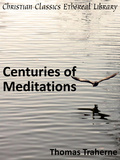Thomas Traherne
English metaphysical poet and divine
Biography
Thomas Traherne (ca. 1636-1674), English poet and religious writer
Traherne, the son of a shoemaker, was born in 1636 or 1637 in Hereford, England. He received his education from the University of Oxford and was ordained as an Anglican clergyman in 1660. Traherne first served in a parish near Credenhill and later became the chaplain to Sir Orlando Bridgeman, Lord Keeper of the Great Seal. In his lifetime, Traherne published only one work, Roman Forgeries (1673), and very little else is known of his biography. Christian Ethicks, his most important prose work, was published posthumously in 1675. His Thanksgivings appeared anonymously in 1699 as A Serious and Patheticall Contemplation of the Mercies of God. Traherne is often considered as the last of the Metaphysical poets, which included such major figures as John Donne, George Herbert, and Henry Vaughn.
The majority of Traherne's poetry remained unknown until 1896, when two of his manuscripts were discovered by chance in a London bookstall. Poetical Works was first published in 1903; it was followed in 1908 by Centuries of Mediations. In 1910, a manuscript found in the British Museum was published as Traherne's Poems of Felicity. More of his work continued to come to light over the course of the twentieth century. As late as 1967 a poetry manuscript attributed to Traherne was discovered on fire in a refuse dump near Lancashire by a man in search of spare auto parts. The manuscript was published as Commentaries of Heaven: The Poems in 1989. Much of his work to this date remains unpublished.
Traherne's great theme is the visionary innocence of childhood, and in this respect he has been compared with William Blake and Walt Whitman. His style, too, bears resemblance to these authors in its incantatory rush, repetitions, and disregard for the rules of standard English. His poems, such as the often-anthologized "Shadows in the Water," suggest that adults have lost the joy of childhood, and with it an understanding of the divine nature of creation. In his writing, Traherne sought to reclaim this joy in the world. Thomas Traherne died in 1674 and was buried in Teddington under the reading desk in the church where he had served.
